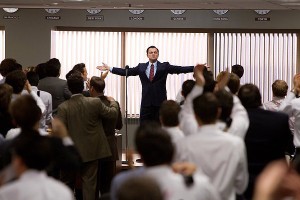 Our good friend Jay Antani at CinemaWriter.com will help us keep up to date with recent reviews of films now playing in theaters. Jay is a graduate of West High School (Class of 1988) and the University of Wisconsin-Madison (Communication Arts). We’ve decided not to hold it against him that he now lives in Los Angeles. Madison readers might recall the recent Isthmus article on Jay’s self-publication efforts with his novel, The Leaving of Things.
Our good friend Jay Antani at CinemaWriter.com will help us keep up to date with recent reviews of films now playing in theaters. Jay is a graduate of West High School (Class of 1988) and the University of Wisconsin-Madison (Communication Arts). We’ve decided not to hold it against him that he now lives in Los Angeles. Madison readers might recall the recent Isthmus article on Jay’s self-publication efforts with his novel, The Leaving of Things.
Jay will be a contributor to the upcoming Madison Film Forum podcast; in his first episode I will explain to him why he is wrong about at least one of the following reviews. Follow the links for the complete reviews at CinemaWriter.com.
The Wolf of Wall Street»
The Wolf of Wall Street, the latest from that freewheeling observer of American crime, Martin Scorsese, can be viewed as a worthy companion piece to the director’s 1990 gangster saga, Goodfellas. Both movies deal with criminal underworlds–Goodfellas with the Italian mafia, Wolf of Wall Street with our financial world’s sub-culture of sleazy stock traders . . . Both Goodfellas and Wolf deal with the inner workings and relationships of crime syndicates and, running parallel to this, are themes of marriage, career, ambition and loyalties within their respective organizations. Watching these movies together gives you the sum total of Scorsese’s stylistic brilliance and his barbed social consciousness.
Inside Llewyn Davis»
I like movies whose plots meander. I like movies whose plots are non-existent, films that are more experimental in their narrative approach. But what’s most frustrating is when a movie loses sight of its thematic purpose, one that floats along, teasing the audience with suggestions of a bigger picture without delivering anything as bold and definitive. Inside Llewyn Davis is that kind of movie.
American Hustle»
By the end, more successful than any of the cons on-screen is the con Hustle plays on its audience, which has now sat through two hours of every ’70s hair and wardrobe cliche, an enjoyable but predictable 70s pop soundtrack and a camera that refuses to sit the hell still. There’s hardly a shot in this film that doesn’t involve the camera flying into or away from a character’s face, presumably to accentuate their drug-addled, anxiety-ridden vortex; the style becomes so repetitious that it soon becomes a lampoon of Scorsese’s Goodfellas and After Hours (both better films by a long shot). Once you’ve untangled the film’s style, which over-wraps the story–exactly as Irving’s combover shrouds the lie underneath–you’ve got a hollow shell of an enterprise, filled only by the hot air of homage, gimmicks and throwbacks. As the end credits roll, you’ll be wondering what all the fuss was about.
Her»
It’s tempting to dismiss this mopey techno-romance as just another spin through the solipsistic post-hipster universe of Spike Jonze, but Her is just too prescient about how humanity’s dependence on technology will escalate to include our total emotional well-being, too well-acted and, finally, too wise and gentle in its prescription for the survival of human interrelationships for any trash talk. While its limited characters can make Her a long slog, Jonze’s observations about the sad, misguided intersection of humanity and technology won me over.